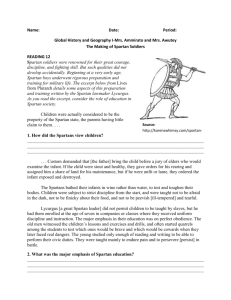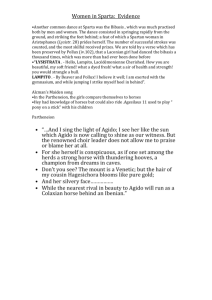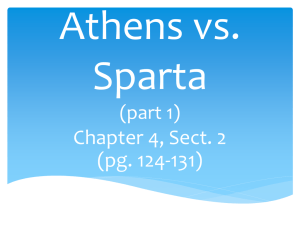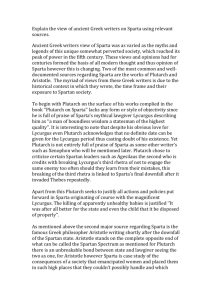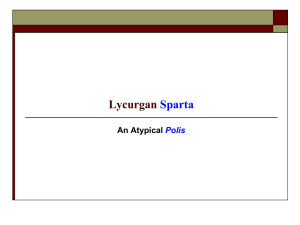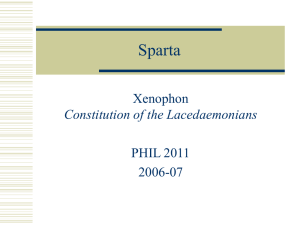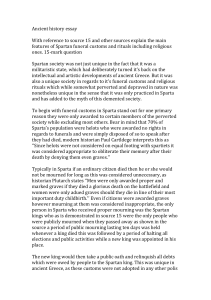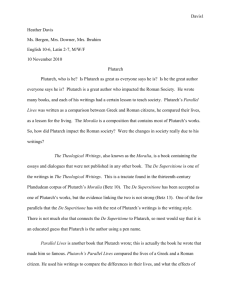Plutarch and Xenophon
advertisement
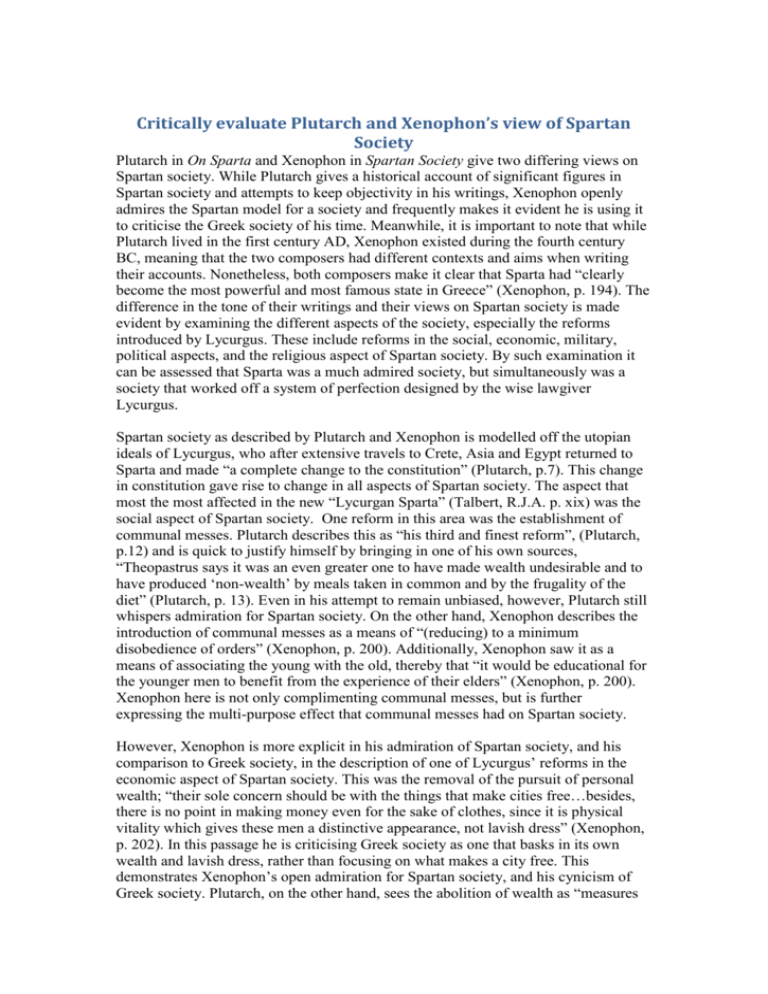
Critically evaluate Plutarch and Xenophon’s view of Spartan Society Plutarch in On Sparta and Xenophon in Spartan Society give two differing views on Spartan society. While Plutarch gives a historical account of significant figures in Spartan society and attempts to keep objectivity in his writings, Xenophon openly admires the Spartan model for a society and frequently makes it evident he is using it to criticise the Greek society of his time. Meanwhile, it is important to note that while Plutarch lived in the first century AD, Xenophon existed during the fourth century BC, meaning that the two composers had different contexts and aims when writing their accounts. Nonetheless, both composers make it clear that Sparta had “clearly become the most powerful and most famous state in Greece” (Xenophon, p. 194). The difference in the tone of their writings and their views on Spartan society is made evident by examining the different aspects of the society, especially the reforms introduced by Lycurgus. These include reforms in the social, economic, military, political aspects, and the religious aspect of Spartan society. By such examination it can be assessed that Sparta was a much admired society, but simultaneously was a society that worked off a system of perfection designed by the wise lawgiver Lycurgus. Spartan society as described by Plutarch and Xenophon is modelled off the utopian ideals of Lycurgus, who after extensive travels to Crete, Asia and Egypt returned to Sparta and made “a complete change to the constitution” (Plutarch, p.7). This change in constitution gave rise to change in all aspects of Spartan society. The aspect that most the most affected in the new “Lycurgan Sparta” (Talbert, R.J.A. p. xix) was the social aspect of Spartan society. One reform in this area was the establishment of communal messes. Plutarch describes this as “his third and finest reform”, (Plutarch, p.12) and is quick to justify himself by bringing in one of his own sources, “Theopastrus says it was an even greater one to have made wealth undesirable and to have produced ‘non-wealth’ by meals taken in common and by the frugality of the diet” (Plutarch, p. 13). Even in his attempt to remain unbiased, however, Plutarch still whispers admiration for Spartan society. On the other hand, Xenophon describes the introduction of communal messes as a means of “(reducing) to a minimum disobedience of orders” (Xenophon, p. 200). Additionally, Xenophon saw it as a means of associating the young with the old, thereby that “it would be educational for the younger men to benefit from the experience of their elders” (Xenophon, p. 200). Xenophon here is not only complimenting communal messes, but is further expressing the multi-purpose effect that communal messes had on Spartan society. However, Xenophon is more explicit in his admiration of Spartan society, and his comparison to Greek society, in the description of one of Lycurgus’ reforms in the economic aspect of Spartan society. This was the removal of the pursuit of personal wealth; “their sole concern should be with the things that make cities free…besides, there is no point in making money even for the sake of clothes, since it is physical vitality which gives these men a distinctive appearance, not lavish dress” (Xenophon, p. 202). In this passage he is criticising Greek society as one that basks in its own wealth and lavish dress, rather than focusing on what makes a city free. This demonstrates Xenophon’s open admiration for Spartan society, and his cynicism of Greek society. Plutarch, on the other hand, sees the abolition of wealth as “measures against their [Spartans] greed” (Plutarch, p. 11). Plutarch more elaborately describes the means by which Lycurgus removed of the pursuit of personal wealth as by making coinage invalid, and replacing the old currency with iron, which had “…such a low value to even a great weight and mass of this, so that a sum of ten minas demanded substantial storage space…”(Plutarch, p.11) thereby making wealth incredibly unattractive; it “excited no envy when possessed” (Plutarch, p.12). Plutarch’s reasoning in this passage demonstrates his attempt to remain objective in his views on Spartan society. Plutarch and Xenophon also comment on the military aspect of Spartan society, which was also affected by Lycurgus’ reforms. Plutarch attempts again to be objective in his description of the Spartans treatment of a fleeing enemy force, “…in their view it was neither noble nor Hellenic to butcher and slaughter men who had given up and yielded their ground” (Plutarch p.28). He reasons this philosophy in saying“…that adversaries saw it as more advantageous to flee…” (Plutarch, p.28) than fight the Spartans, who would let them live if they fled. Although by describing the Spartans actions not to slaughter fleeing enemies Plutarch is in fact complimenting the Spartans, by mentioning the philosophy behind the actions Plutarch is keeping his objective approach to the subject. Xenophon, on the other hand, depicts the Spartans in combat as quite reputable and fearsome. He begins his section on the Spartan military aspect with the line “…if anyone wishes to understand how Lycurgus also caused their organization on campaign to be superior to that of the others, he should pay attention to what follows” (Xenophon, p. 206). This demonstrates that Xenophon highly admires the organization and the effectiveness of the Spartan military against “the others”, which is a reference to other Greek states that have warred with Sparta. This comment acknowledges the notion that Xenophon is using Spartan Society to criticise Greek society, and clearly shows that Xenophon has a very strong admiration of Spartan society. In commenting on the affected political aspect of Spartan society by Lycurgus, Plutarch and Xenophon comment on the changing role of a king. Since Lycurgus’ reforms, a king no longer is exempted from the activities of an ordinary citizen. Plutarch mentions a specific example of where King Agis wanted to eat at home with his wife, rather than attend the communal mess. In response, “the polemarchs would not send (his rations),” to his home, and “the next day in his fury, he did not carry out the required sacrifice, and then they fined him” (Plutarch, p.15). In this example, Plutarch gives a reason why events occurred, successfully staying objective on the matter. Xenophon, however, shows praises Lycrugus’ initiative on changing the role of a king, mentioning not only that the prerogatives to a king at home in his lifetime was “nothing much above the level of private citizens”, but that “the aims of the laws of Lycurgus here is to demonstrate that they have been given special honour to Spartan kings not as humans but as heroes”. (Xenophon, p.211) Xenophon is praising Lycurgus here as he is admitting that the way in which Lycurgus made a king work on the level of a citizen, and be able to do thing such as “lead the army wherever the city despatches it” (Xenophon, p.211) that king is more respected by his people. This further demonstrates Xenophon’s open admiration for Spartan society. Plutarch’s attempted objectivity and Xenophon’s respect for Sparta are also highlighted by their comments on religious aspects of Spartan society. Plutarch highlights in On Sparta that religion was a quintessential part of their lifestyle, especially in describing a ritual of the Spartan ephors; “the ephors pick a moonless night, and sit in silence gazing up at the sky. Should, then, a star shoot from one sector to another sector, they conclude that the kings have committed some fault relating to religion”. (Plutarch, p.90) Plutarch staples a strong sense of sanctity to this ritual, and does not give any opinion on it, therefore keeping his objectivity in this area. On the other side of the coin, Xenophon mentions Lycurgus’ visit to Delphi before issuing the reforms to his people, in order to gain religious justification. Xenophon takes this opportunity to express his high opinion of Sparta once again, noting that “…Lycurgus was responsible for many other admirable devices. One of the most admirable is this…” (Xenophon, p. 203) before going on to describe his visit to Delphi. This further demonstrates Xenophon’s not only respect for Lycurgus, but his by-product of ‘Lycurgan Sparta’. While Plutarch is evidently an admirer of Spartan society in parts of his account, he admires it significantly more subtly than Xenophon, whose expression of admiration for Spartan society goes as far as to say “the most extraordinary thing of all is that despite the universal praise for such a code of behaviour, not a single city is willing to copy it” (Xenophon, p.205). Additionally, Xenophon’s criticism of Greek society is also expressed in his account, also evident in the earlier quotation. Through close examination of social, economic, military, political and religious aspects of both Lycurgus’ reforms and Spartan society, Plutarch and Xenophon’s views on Spartan society can be successfully evaluated and distinguished from one another. Bibliography Plutarch. On Sparta. Talbert, R. (1988). On Sparta (Introduction). London: Penguin. Xenophon. Spartan Society.
